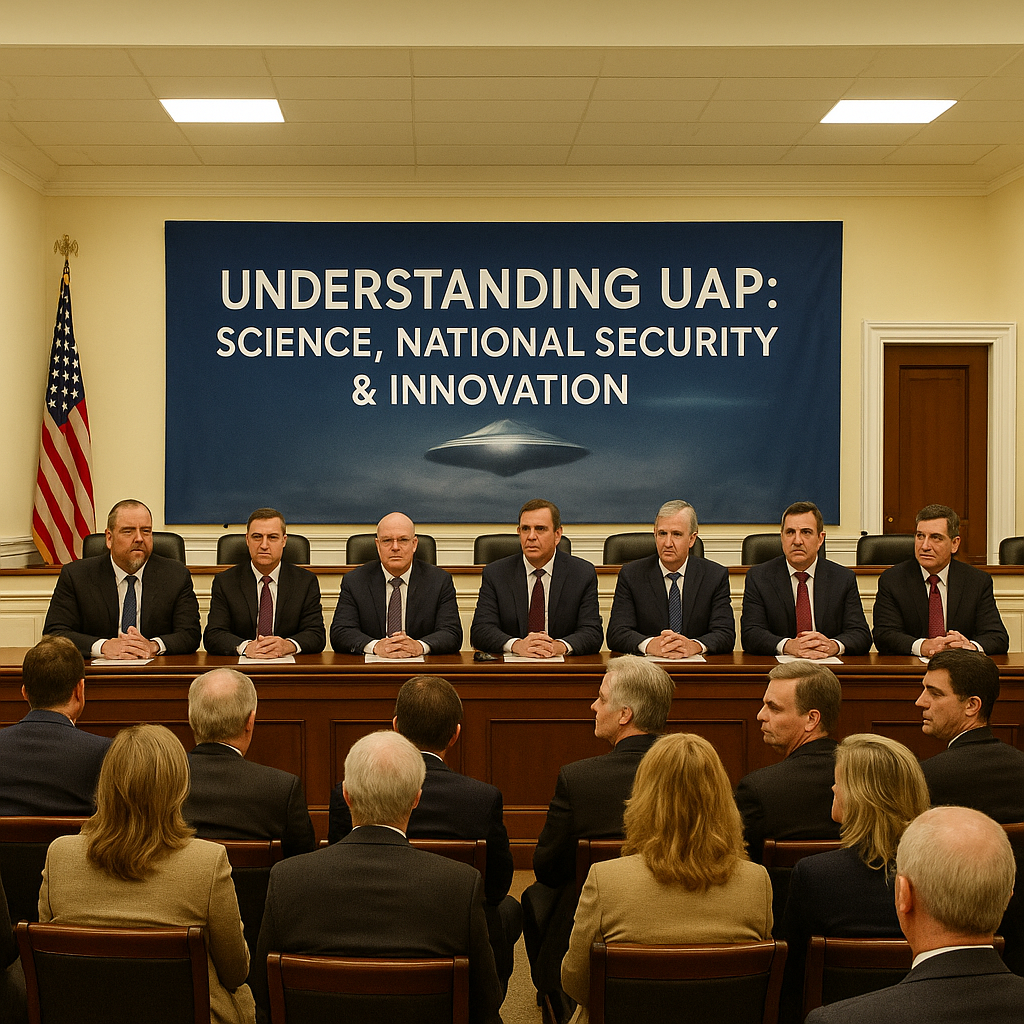Understanding UAP: Science, National Security & Innovation

The congressional briefing titled Understanding UAP: Science, National Security & Innovation marked a significant and timely step in elevating the national conversation around unidentified anomalous phenomena (UAP). Hosted by the UAP Disclosure Fund (UAPDF) in partnership with the bipartisan Task Force on the Declassification of Federal Secrets and supported by the House Committee on Oversight and Accountability, the event was designed to provide lawmakers with a science-first understanding of UAP data and its implications. Held at 11:30am ET on May 1, 2025, in Room 2247 of the Rayburn House Office Building, the livestreamed congressional briefing brought together a roster of respected voices from academia, defense, and technology. The event, open to the public and viewed widely online, offered a structured and in-depth exploration of UAP-related issues, helping to elevate the national conversation beyond speculation and into the realms of evidence-based science, policy reform, and technological innovation.
The UAP Disclosure Fund (UAPDF) is a nonprofit, nonpartisan organization focused on increasing transparency and public access to credible data surrounding unidentified anomalous phenomena. Staffed by former intelligence officials, scientists, defense professionals, and policy experts, the UAPDF funds research, briefings, and public education initiatives aimed at bringing UAP-related information into the public domain through rigorous, evidence-based methods. The Task Force on the Declassification of Federal Secrets is a bipartisan initiative within Congress that works to identify and challenge unnecessary overclassification in government, especially when it concerns science, security, or public trust. Its efforts have grown increasingly relevant in the context of UAP, where withheld data may carry implications for national defense and technological advancement. Supporting the briefing was the House Committee on Oversight and Accountability—one of Congress’s most powerful investigative bodies—tasked with ensuring transparency and rooting out mismanagement across federal agencies. Their involvement lent weight to the event and signaled growing institutional recognition of the importance of UAP-related oversight.
Moderator Luis Elizondo, a central figure in the public emergence of UAP dialogue, formerly led the Pentagon’s Advanced Aerospace Threat Identification Program (AATIP). During his tenure, he investigated military encounters with UAP and later resigned due to what he described as excessive secrecy and bureaucratic resistance. Since then, Elizondo has played a pivotal role in raising public awareness, appearing in high-profile interviews, documentaries, and congressional hearings while advocating for greater transparency around the phenomenon. On the Science Panel, Dr. Avi Loeb—Frank B. Baird Jr. Professor of Science at Harvard and founder of the Galileo Project—has become one of the most outspoken academic voices suggesting the potential for intelligent extraterrestrial origins behind certain phenomena. His controversial work on interstellar object ‘Oumuamua sparked global debate and laid the groundwork for a more systematic scientific inquiry into anomalous space objects. Dr. Eric Davis, a theoretical physicist with expertise in exotic propulsion concepts, is known for authoring multiple Defense Intelligence Reference Documents (DIRDs) under Pentagon contract, some of which addressed topics like warp drives, wormholes, and non-Earth-origin technology. Davis has also been cited in leaked government briefings regarding the alleged recovery of “off-world vehicles.” Rear Admiral Tim Gallaudet, former Oceanographer of the Navy and Acting Administrator of NOAA, brought deep domain awareness to the table. He has emphasized the need to track UAP interactions within marine environments and weather systems—areas that have often been overlooked in traditional airspace monitoring.
The National Security Panel featured Christopher Mellon, a former Deputy Assistant Secretary of Defense for Intelligence and longtime Staff Director for the Senate Select Committee on Intelligence. Mellon has been instrumental in encouraging whistleblowers to come forward and pushing for declassified military videos to reach the public. His advocacy played a key role in bringing Navy UAP encounters—like the “Tic Tac” and “Gimbal” videos—into public discourse in 2017. Kirk McConnell, with decades of experience as a senior staffer for both the Senate Intelligence and Armed Services Committees, has been quietly influential in crafting legislation related to UAP transparency. His involvement in shaping intelligence authorization language helped compel agencies to begin reporting on UAPs and enhanced Congress’s ability to track defense-related UAP initiatives.
The Innovation Panel turned the conversation toward future potential. Anna Brady-Estevez, formerly a program director for the National Science Foundation’s Small Business Innovation Research (SBIR) program, brought a keen understanding of how government-backed R&D intersects with private-sector innovation. Now a venture partner in the deep tech space, she highlighted the economic and strategic possibilities of breakthroughs in UAP-adjacent technologies, including energy generation and sensor systems. Mike Gold, whose career spans top leadership roles at NASA and private aerospace firms, has served as a key liaison between government space agencies and commercial partners. A member of NASA’s UAP Independent Study Team, Gold emphasized the importance of interagency coordination and international partnerships to responsibly navigate the unknowns posed by UAP encounters, particularly when it comes to shared airspace and orbital surveillance.
Together, the experts at this congressional briefing helped reframe the UAP conversation—from a topic long relegated to secrecy and speculation into one grounded in science, defense readiness, and technological opportunity. The message was clear: understanding UAP is no longer a fringe endeavor, but a credible and necessary part of preparing for the future.

